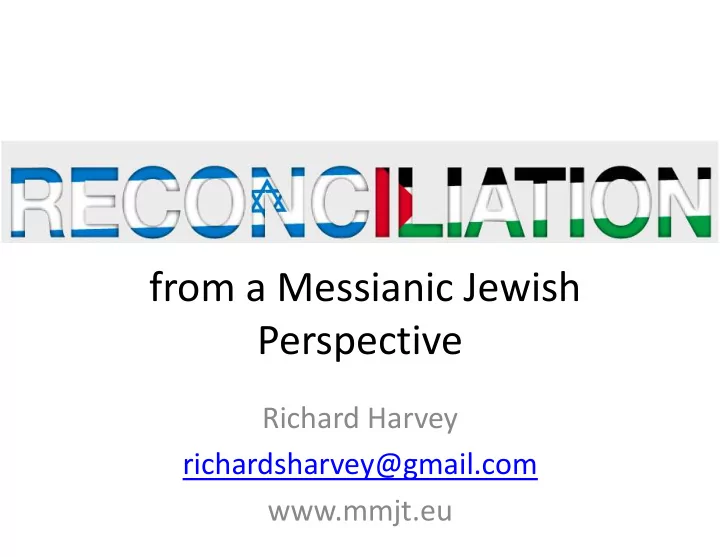

from a Messianic Jewish Perspective Richard Harvey richardsharvey@gmail.com www.mmjt.eu
B rothers Hirschland, London
Mapping Messianic Jewish Theology • Surveying the field • 150,000 Messianic Jews? • Need for theology and praxis of reconciliation • The Mission of Messianic Judaism
C ommunion in the Messiah – Lev Gillet • Anticipates the modern Messianic movement • C o-operates with Paul Levertoff • Articulates the mystery of the C hurch and Israel • Integrates a spirituality of Judaism and C hristian sources
Gillet’s Synagogued C hristianity A Jewish C hristianity implies, as we have seen, something quite different from the individual adhesion to any present C hristian mission or C hurch. It implies a C hristian faith and a Jewish religious environment. Such a combination could be achieved along two lines. We shall call the first way ‘un-synagogued Jewish C hristianity’ and the second ‘synagogued Jewish C hristianity.’ • Lev Gillet, Communion in the Messiah, 206.
What is Mission? • Our committed participation – as God’s people – at God’s invitation and command – in God’s own mission – within the history of God’s world – for the redemption of God’s creation. • C hristopher J. H. Wright, Mission of God (2006:23)
C harles Simeon’s Question "If the conversion of the six million is to be life from the dead to the six hundred million – what then?” (Gidney 1908:273)
Messianic Jewish Missiology • The theory and practice of Messianic Jewish mission • Applying the special calling of Messianic Jews in the purposes of God, as belonging to both the C hurch and Israel. • Standing on the twin epistemic foundations of the ongoing election of Israel (the Jewish people) and the uniqueness of Yeshua
The Missing Peace Reconciliation
A Complex System of Conflict Complexes Arab – Israeli (Syria-Lebanon) Arab Spring? Middle East Turkey/Iran Israeli- Palestinian conflict Judaism Islam- Christianity The West Islam USA Europe Global Powers
Reconciliation Partners in the Church Palestinian Christians Arab Christian Christians Zionists M essianic Jews Christian Wider “Anti- Church Anti- Zionists” “Christian Zionists”
Reconciliation - Process and Product Reconciliation goes • b eyond conflict resolution • changing the motivations, goals, beliefs, attitudes and emotions • the nature of the relationships between the parties • the parties themselves ( B ar-Tal and Gemma H. B ennink 2004:12)
Reconciliation Requires (a) resolution of the conflict (b) mutual acceptance and respect (c) development of sense of security and dignity (d) establishment of co- operative interaction (e) institutionalization of conflict resolution mechanisms ( B ar-Tal and B ennink, 2004: 20)
Intra-Societal Reconciliation T ruth – open expression of the past Mercy - forgiveness to enable new relations Justice - restitution and social restructuring Peace – a common future, wellbeing, and security for all the parties . (Lederach, 1997)
“ The Place C alled Reconciliation” • Truth • Mercy – Acknowledgment – Acceptance – Transparency – Forgiveness – Revelation – Support – C larity – C ompassion • Justice – Healing – Equality • Peace – Right relationships – Harmony – Restoration – Unity – Restitution – Well-being Mercy and truth are met together; righteousness – Security and peace have kissed each other. (Psalm 85:10) – Respect
Strategic Engagement of Discourses • Level 1: Inclusive systemic strategic thinking within each conflict party • Level 2: Resultant scope for communication across the spectrum between conflict parties • Level 3: Greater clarification of the task of peacemakers, both internal and third party (Ramsbotham 2010: 192)
Hexagon of Radical Disagreement
Through My Enemy’s Eyes 1. B rief History of the C onflict 2. History and Narrative 3. Israeli/Palestinian Historiography 4. Palestinian C hristianity 5. Israeli Messianic Jewish Identity 6. Reading Scripture as a Palestinian C hristian 7. Reading Scripture as an Israeli Messianic Jew 8. Theological Disagreements 9. Towards a Theology of Reconciliation 10. Appendix: Stages of Reconciliation
B uilding Peace “ If this task of building a peaceful world is the most important task of our time, it is also the most difficult. It will, in fact, require far more discipline, more sacrifice, more planning, more thought, more cooperation and more heroism than ever war demanded.”
Recommend
More recommend